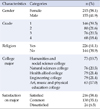Abstract
Purpose
This study was conducted to investigate the relationships among trait anger, anger expression, positive thinking, and gratitude in college students.
Methods
The participants were 370 college students recruited from two universities in P and D cities. Data were analyzed using descriptive analysis, t-test, ANOVA, Pearson correlation coefficients, and hierarchical regression analysis with the SPSS/WIN 20.0 program.
Results
There were significant differences in trait anger and anger-in according to religion and college majors. Moreover, anger-control differed according to college majors. There were significant correlations among trait anger, anger expression, positive thinking, and gratitude. Positive thinking was a significant factor of trait anger explaining 17.0% of the variances. Positive thinking and gratitude were significant factors of anger-control explaining 12.0% of the variances.
Figures and Tables
References
1. Editorial Team. Anger control disorder symptom. Data News. 2015 February 09;Sect. 09. http://www.datanews.co.kr/site/datanews/DTWork.asp?aID=20150209041954103.
2. Baek SH, Hyun MH. Hostility, anger experience and anger expression in overt and covert narcissists. Korean J Clin Psychol. 2008; 27(4):1001–1017.

3. Lee JS, Lee H, Ahn YY, Yoo JS, Kwon SJ. Research trends of anger management programs-focusing on Korean theses and dissertations (1996~2008). Korean J Child Psychother. 2010; 5(1):1–22.
4. Yang NY, Song MS. Health allied college students' interpersonal relationships and purpose-in-life depending on their ability to manage anger. J Korean Public Health Nurs. 2014; 28(1):46–56. DOI: 10.5932/JKPHN.2014.28.1.46.

5. Blanchard-Fields F, Coats AH. The experience of anger and sadness in everyday problems impacts age differences in emotion regulation. Dev Psychol. 2008; 44:1547–1556. DOI: 10.1037/a0013915.

6. Steiner H, Saxena K, Chang K. Psychopharmacologic strategies for the treatment of aggression in juveniles. CNS Spectr. 2003; 8:298–308.

7. Cha NH, Sok SR. Depression, self-esteem and anger expression patterns of Korean nursing students. Int Nurs Rev. 2014; 61(1):109–115.

8. Choo MR, Kim CH. The relationships of trait anger, angry thoughts, and expression of anger to dysfunctional communication patterns. Korean J Couns Psychother. 2008; 20(4):1023–1039.
9. Seo SG. Cognitive factors related to anger and their therapeutic implications [dissertation]. [Seoul]: Seoul National University;2004. 167.
10. Park S, Loh Y, Cho EH, Lee D. Differences in interpersonal problems and happiness by the subgroups of anger expression styles. Korean J Soc Pers Psychol. 2011; 25(3):77–92.

11. Goh HG, Hyun MH. The mediation effect of cognitive coping strategies on the relationships between perfectionism and anger expression. Korean J Clin Psychol. 2009; 28(1):97–116. DOI: 10.15842/kjcp.2009.28.1.006.
13. Kim HJ, Oh Y, Oh GS, Suh DW, Shin YC, Jung JY. Development and validation study of the positive thinking scale. Korean J Health Psychol. 2006; 11(4):767–784.
14. Park Y, Wee H. The influence of purpose in life, gratitude, and depression on anger in nursing college student. J Korean Data Anal Soc. 2013; 5(5):2685–2700.
15. Wong SS. Negative thinking versus positive thinking in a Singaporean student sample: relationships with psychological wellbing and psychological maladjustment. Learn Individ Differ. 2012; 22:76–82. DOI: 10.1016/j.lindif.2011.11.013.

16. Kwon SJ, Kim KH, Lee HS. Validation of the Korean version of gratitude questionnaire. Korean J Health Psychol. 2006; 11(1):177–190.
17. Watkins PC, Woodward K, Stone T, Kolts RL. Gratitude and happiness: development of a measure of gratitude, and relationships with subjective well-being. Soc Behav Pers. 2003; 31:431–451.

18. Seoh D, Park S. The effects of a thanksgiving program on children's anger control. Korean J Elemen Couns. 2009; 8(1):79–94.
19. Spielberger CD, Krasner SS, Solomon EP. The experience, expression and control of anger. New York: Springer Verlag;1988. p. 32. (Janisse MP, editor. Individual differences, stress, and
health psychology).
20. Chon KK, Hahn DW, Lee CH, Spielberger CD. Korean adaptation of the state-trait anger expression inventory: anger and blood pressure. Korean J Health Psychol. 1997; 2(1):60–78.
21. McCullough ME, Emmons RA, Tsang J. The grateful disposition: a conceptual and empirical topography. J Pers Soc Psychol. 2002; 82:112–127. DOI: 10.1037//0022-3514.82.1.112.

22. Choi J, Cha BK. Factors affecting learned helplessness in undergraduates. J Korean Public Health Nurs. 2014; 28(3):509–521. DOI: 10.5932/JKPHN.2014.28.3.509.

23. Song M. The influence of anger, alienation on alcohol addiction, and internet addiction: behavioral activation as mediator. Forum Youth Cult. 2013; 36(1):60–83.
24. Park SI, Kim S. Mediating effect of self-efficacy in the relationship between anger and functional health of homeless men. J Korean Acad Nurs. 2014; 44(4):361–370. DOI: 10.4040/jkan.2014.44.4.361.

25. Kim HY, Kim CH, Lee YS. The effects of the forgiveness program on forgiveness degree, anger, anxiety, and depression. Korean J Couns Psychother. 2004; 16(3):347–366.
26. Chung SJ, Suh KH. Trait forgiveness, state forgiveness and forgiveness determinant of Korean college students. Korean J Youth Stud. 2011; 18(6):147–169.
27. Whang SJ. The relationship between clinical stress, self-efficacy, and self-esteem of nursing college students. J Korean Acad Soc Nurs Educ. 2006; 12(2):205–213.
28. Cho YH, Kim BC, Kim BJ. Investigation into the influential factors on employment outcomes of university graduates. J Educ Admin. 2008; 26(2):437–462.
29. Jung JH, So YH. The influence of aggression on the depression and anger level of physical education. Korean J Phys Educ. 2007; 46(3):43–54.
30. Lightsey OR, Johnson E, Freeman P. Can positive thinking reduce negative affect?: a test of potential mediating mechanisms. J Cogn Psychother. 2012; 26(1):71–88. DOI: 10.1891/0889-8391.26.1.71.





 PDF
PDF ePub
ePub Citation
Citation Print
Print







 XML Download
XML Download